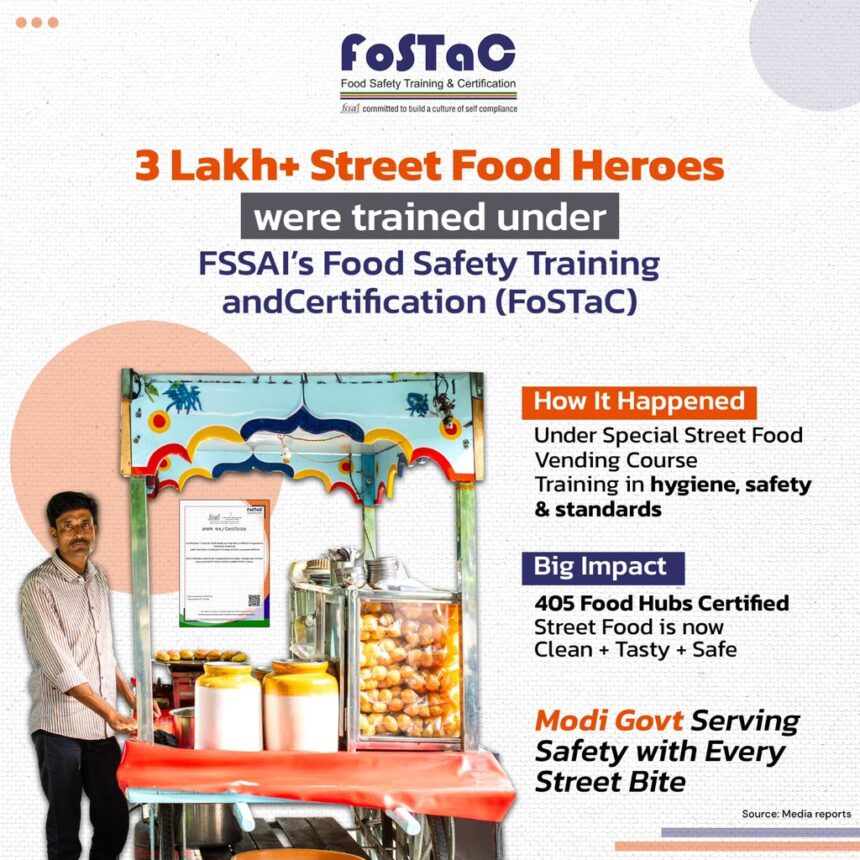FSSAI’s Food Safety Training and Certification (FoSTaC): A Complete Guide
Food safety is a critical concern in India, especially with the rise of restaurants, food delivery services, and street vendors. The Food Safety and Standards Authority of India (FSSAI) launched the Food Safety Training and Certification (FoSTaC) program to ensure food handlers are educated, trained, and certified in proper food hygiene and safety practices.
- History and Background of FoSTaC
- Types of FoSTaC Training
- Key Features of FoSTaC
- Timeline and Implementation
- Fun Facts About FoSTaC
- FAQs About FoSTaC
- Significance of FoSTaC in Daily Life
- Daily Life Impact and Societal Contributions
- Wishing and Celebrating FoSTaC
- Conclusion: FoSTaC as a Transformative Initiative
FoSTaC is designed to improve public health, enhance business credibility, and ensure compliance with legal regulations, making it a vital initiative for the food industry.
History and Background of FoSTaC
Launch: FSSAI introduced FoSTaC as part of its mission to strengthen food safety across India.
Purpose: To train food handlers and food business operators on hygiene, storage, preparation, and handling of food.
Coverage: Applicable to street vendors, restaurants, hotels, catering services, and institutional food setups.
Legal Basis: The program aligns with the Food Safety and Standards Act, 2006, which mandates safe food practices and compliance.
FoSTaC bridges the gap between food safety laws and practical training, ensuring that all food businesses maintain high hygiene standards and consumer confidence.
Types of FoSTaC Training
Basic Food Safety Training (Level 1):
Targeted at food handlers, including restaurant staff, street vendors, and canteen workers.
Duration: 2–3 hours
Focus: Personal hygiene, cleaning procedures, and safe food handling
Advanced Food Safety Training (Level 2):
For supervisors, managers, and larger food businesses.
Duration: 6–8 hours
Focus: Risk management, HACCP principles, and advanced hygiene protocols
Specialized Training Modules:
Includes courses for packaged food operators, milk and dairy handlers, and food transport personnel.
Key Features of FoSTaC
Short Duration: Training is designed to be quick and efficient for busy food business operators.
Certification: Participants receive a FoSTaC certificate, recognized by FSSAI.
Online & Offline Options: Flexible training modes to accommodate participants nationwide.
Practical Approach: Focuses on real-life food handling scenarios.
Legal Compliance: Helps businesses adhere to FSSAI regulations and avoid penalties.
Timeline and Implementation
2019: FoSTaC program introduced for street food vendors and small eateries.
2020–2022: Expanded to cover hotels, restaurants, and institutional food handlers.
2023–2025: Digital platforms introduced, enabling online training and certification across India.
Ongoing: FSSAI continues to upgrade the program, adding advanced modules and specialized training.
Fun Facts About FoSTaC
Over 10 lakh food handlers have been trained since its inception.
FoSTaC certificates are mandatory for FSSAI license applications.
Street food vendors who complete FoSTaC are more likely to gain consumer trust and higher sales.
FSSAI provides multilingual training to reach a wider audience.
FoSTaC uses interactive videos, quizzes, and real-world examples for engaging learning.
The program has reduced food-borne illness risks in participating regions.
Certified food businesses often receive special recognition and awards from local authorities.
FAQs About FoSTaC
Q1: Who should undergo FoSTaC training?
A: Food handlers, restaurant staff, street vendors, hotel employees, catering service personnel, and institutional food operators.
Q2: Is FoSTaC certification mandatory?
A: Yes, FSSAI mandates certification for certain food handlers and operators, especially for licensing purposes.
Q3: How long is the FoSTaC certificate valid?
A: Certificates are generally valid for 3 years, after which refresher training may be required.
Q4: Are there online options for FoSTaC?
A: Yes, FSSAI provides online training modules, making it easier for participants across India.
Q5: What topics are covered in FoSTaC?
A: Hygiene, food handling, storage, cleaning procedures, risk management, and legal compliance with FSSAI.
Significance of FoSTaC in Daily Life
Enhanced Food Safety: Certified food handlers reduce the risk of contamination, ensuring safer meals for consumers.
Consumer Trust: Customers feel confident dining at certified establishments, boosting business reputation.
Legal Compliance: FoSTaC helps businesses avoid fines and legal issues related to food safety violations.
Workplace Safety: Training improves workplace hygiene and employee health.
Community Health Impact: Broad adoption of FoSTaC reduces the prevalence of foodborne diseases in society.
Daily Life Impact and Societal Contributions
Restaurants & Eateries: Safer food, happier customers, and increased revenue.
Street Vendors: Improved hygiene and customer trust, promoting sustainable livelihoods.
Schools & Institutions: Ensures that students receive safe meals, reducing absenteeism due to illness.
Catering Services: Enhances professional credibility and client confidence.
Overall Society: Promotes public health, awareness, and responsible food practices nationwide.
Wishing and Celebrating FoSTaC
“Wishing all food handlers success in their FoSTaC training! May safe, hygienic, and healthy food reach every home in India.”
FoSTaC can also be celebrated in food festivals, training drives, and awareness campaigns, emphasizing the importance of food safety and public health.
Conclusion: FoSTaC as a Transformative Initiative
FSSAI’s Food Safety Training and Certification (FoSTaC) is more than just a certification program; it is a movement towards safer, healthier, and more trustworthy food practices in India.
Key takeaways include:
Education & Awareness: Food handlers gain practical knowledge on hygiene and safety.
Consumer Protection: Ensures that meals consumed by millions are safe and healthy.
Business Growth: Certified operators gain competitive advantage and trust.
Public Health Impact: Reduces food-borne illnesses and health risks.
Social Responsibility: Promotes a culture of ethical food practices and accountability.
By embracing FoSTaC, India is moving towards a safer, healthier, and more responsible food ecosystem, benefiting both businesses and consumers. Every certified food handler contributes to a safer India, making it a program of enormous societal significance and positive impact.
FoSTaC is truly a powerful initiative, combining knowledge, compliance, and social responsibility, ensuring that food served across the country is safe, hygienic, and trustworthy.








